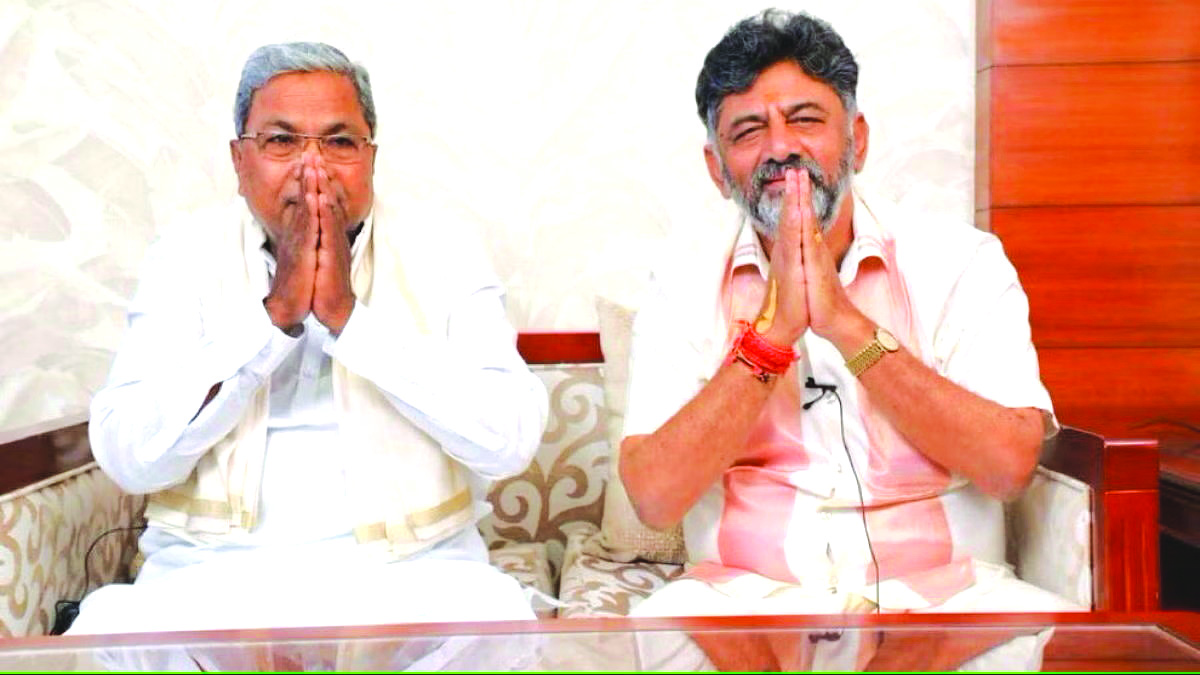Reshma Ravishanker (Bangalore)

Deputy CM D.K. Shivakumar (right): NEP 2020 rejected
The newly-elected congress government of Karnataka, which won a bitterly fought legislative election against the BJP in May, has discharged its election manifesto promise of scrapping the National Education Policy (NEP) 2020 promulgated by the BJP government at the Centre.
On August 21, deputy chief minister D.K. Shivakumar announced that the state government has discontinued implementation of NEP 2020 from this academic year (2023-24), and begun work on framing its own State Education Policy (SEP). However, he said that higher education institutions in the state which had already implemented NEP 2020 in academic years 2021-22 and 2022-23 — the then BJP government of Karnataka was first off the blocks to implement NEP 2020 promulgated after an interval of 34 years — will be permitted to continue with its provisions until current student batches graduate.
Within the state’s academia, the dominant sentiment is of dismay that NEP 2020, which was in the works for over four years and finally approved by the Union Cabinet in July 2020 based on the 484-page NEP 2019 draft prepared by a nine-member committee headed by former space scientist Dr. Krishnaswamy Kasturirangan, has been rejected.
NEP 2020 has been widely welcomed by knowledgeable academics for proposing root-and-branch reform of India’s moribund education system from preschool to PhD. In particular for according high importance to early childhood care and education, flexibility in the higher education system through multiple exit and re-entry options and recommending gradual phase out of the system of undergrad colleges affiliating with parent universities.
Dr. Chetan Singhai, Bengaluru-based educationist and Chief Consultant, Technical Secretariat, Committee to Draft the NEP 2020, believes that the state government is being “blind-sided” by political animosity towards the BJP. “NEP 2020 is a vision document prepared after prolonged consultation with all stakeholders from national to district levels. All states, except Tamil Nadu and Kerala, participated and presented position papers which have been incorporated into NEP 2020. The impulsive decision of the Congress government to reject
NEP 2020 will adversely impact students from Karnataka when they enter higher education and the jobs market. Many universities have restructured their postgraduate programmes in alignment with NEP 2020. Blanket rejection of this democratically and painstakingly devised policy without evaluating its objectives is imprudent,” warns Singhai. This viewpoint is seconded by D. Shashi Kumar, general secretary,
Associated Managements of Private Schools of Karnataka (KAMS), which has a membership of over 4,000 schools statewide. “The peremptory rejection of NEP 2020 is autocratic. The policy has incorporated several recommendations made by the Karnataka Knowledge Commission constituted by the previous Congress government. The state government needs to take a mature stand by studying the policy and
changing only those proposals they disagree with. It should not reject the policy in toto,” says Shashi Kumar.
However, Prof. A.S. Seetharamu, former professor of education, Institute of Social and Economic Change, Bengaluru, believes that the
newly-elected Congress government is justified in revoking implementation of NEP 2020, and drafting its own SEP. “NEP has numerous flaws and internal contradictions. It does not reflect our cherished constitutional values in its goals or content. For instance, there is no cause to tamper with three-year undergraduate courses. Moreover, NEP 2020 gives scant attention to technical, vocational, skill-based courses. The curriculum has been ‘saffronised’ with utter disregard for the history and cultures of states, and there are no financial estimates or riders for provision of good quality education. The Congress government has done well to reject NEP 2020. Now it should begin a thorough consultative process involving all sections, interest groups, reputed NGOs and academia to draft a new SEP,” says Prof. Seetharamu.
As we go to press, the state government has announced setting up of a committee to start the consultation process for drafting Karnataka’s SEP. However, there is considerable unease within the educators, parents and students communities about breaking away from the painstakingly drafted NEP 2020, and uncertainty about the shape and form of the proposed SEP.
NEP 2020 was formulated on the recommendations of two high-powered committees following consultation with thousands of stakeholders
including eminent educationists, teachers, NGOs and experts. Now the process will have to start all over again.
Also read: Karnataka: Experts disappointed over roll back of NEP 2020























